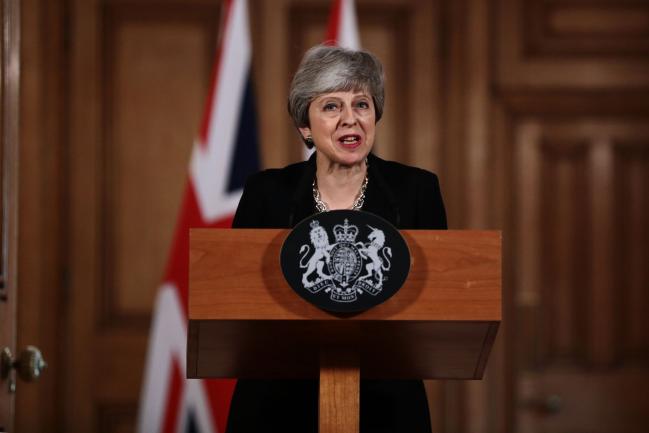(Bloomberg Opinion) -- Theresa May’s Tuesday evening announcement wasn’t a great capitulation. This prime minister moves by increments, not by hard turns or with breaks screeching. She moves only when she has to, as far as she has to.
After seven hours of cabinet meetings that clearly did little to settle the acrimony and fractiousness we have seen in her party, she came out and did the minimum she needs to keep her Brexit deal alive and hold on to some semblance of control of a process over which she is no longer in full charge.
That doesn’t mean her statement isn’t significant. She has tried to put the ball in the Labour party's court, forcing them to co-author a solution or become the joint owners of a no-deal departure, if that is what happens. Under Jeremy Corbyn, the opposition party has been shape-shifting on Brexit for two years. It claims to be determined to stop a no-deal exit; now it has the chance to be part of the solution.
May’s statement is also an admission that her own party is incapable of coming together. In reaching out to Labour, she is giving her hardliners a challenge: If a cross-party solution is found that results in Britain leaving the European Union by May 22, will Brexiters really scupper that and blow up the party because the outcome isn’t a hard enough form of Brexit? Really?
But let's be clear: She’s not offering a national unity government, inviting Labour to share power, as many have urged should happen.
She's not giving up on her withdrawal agreement. Her statement says it has to be passed, and she’s right. Even if the U.K. were to leave with no deal at all, the EU would only ever agree to restart trade talks on the same conditions as those in the withdrawal agreement. That means payments into the EU budget, protection of EU citizens’ rights and, of course, keeping the Irish border open. The deal parliament rejected three times still has to pass.
She's not saying she wants a long delay – that would require participating in the European Parliamentary elections, which the prime minister wants to avoid. She merely says she wants the EU to extend Britain’s departure deadline until May 22 to allow her time to pass a deal and the implementing legislation.
She didn't call a new election.
She didn't resign.
She didn’t rule out a no-deal exit specifically.
What has changed then? May appears to recognize that she needs to find a way to tweak the political declaration – the non-binding part of the exit package – to get it over the line. Labour wants a commitment to closer ties with the EU, and this is their chance to secure that, though official negotiations on the future relationship cannot begin until Britain has actually left the bloc.
Of course, May has reached out to Labour before and it has come to nothing. Still, it is possible this time will be different. The clock is ticking toward a no-deal exit. Finding a cross-party solution is her last hope of avoiding an election, or a long extension or, worse, failing to deliver Brexit, her central mission since becoming prime minister. Labour may be more motivated given that the Tories clearly can’t drive a solution without the support of the opposition, and a general election can’t be far off.
Ultimately, though, parliament must choose between May’s exit deal and a closer EU relationship, or plunging into the unknown of a new election or long-term extension to EU membership. And the country is no closer to making that fundamental choice.
